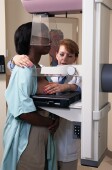
THURSDAY, Oct. 7 (HealthDay News) — Women with an early form of breast cancer who have dense breasts may be at higher risk of getting a second breast cancer, particularly in the opposite breast, a new study indicates.
“The risk appears to be stronger for the opposite breast than for the breast that originally had the cancer,” said Laurel A. Habel, a research scientist at Kaiser Permanente’s Division of Research in Oakland, Calif.
Habel is lead author of the study published Oct. 7 in Cancer Epidemiology, Biomarkers & Prevention.
Women with the most dense breasts, as seen on mammograms, “were at about twice the risk of a second cancer, and the risk was closer to threefold for the opposite breast,” Habel said.
Dense breast tissue is made up mostly of ductal structures and connective tissue, while non-dense breast tissue is mostly fatty, Habel said. On a mammogram, dense tissue appears white; non-dense looks dark gray.
Experts can’t say for sure why density is linked with cancer risk, Habel said, but these findings echo the results of previous studies. In 2004, Habel’s team reported a link between denser breasts and a higher risk of second breast cancers among women with ductal carcinoma in situ (DCIS), very early breast cancer, who were enrolled in a clinical trial.
Other research, published in 2007, found that DCIS patients with higher breast density were at increased risk of a second cancer in the opposite breast.
In the most recent study, conducted from 1990 to 1997, Habel’s team followed 935 women diagnosed with early-stage breast cancer (DCIS) who underwent breast-conserving surgery. The follow-up was for a median of more than eight years. During that time, 164 (18 percent), had a second cancer in the same breast, and 59 (6 percent) had a new cancer in the opposite breast.
Habel said she can’t explain the higher risk for the opposite breast. “What we do see is, the amount of density is quite similar in both breasts,” she said.
Previous research has established breast density, which is influenced by genetic factors, as a strong risk factor for getting breast cancer, although Habel said she suspects many women are still not aware of it as a risk factor.
Women aren’t routinely told if their mammogram reveals dense breasts, although doctors may mention extreme density, she said.
“It’s good to know if they’re dense,” said Dr. Joanne Mortimer, director of women’s cancer programs at the City of Hope Comprehensive Cancer Center in Duarte, Calif.. A women can ask her doctor, she said.
Breast density declines with age, and obese women have denser breasts than leaner women, Mortimer said.
The new study, she said, confirms earlier research. The practical aspect may be to help women make treatment decisions, she said.
For instance, some women diagnosed with breast cancer choose to undergo a mastectomy on the unaffected breast as a preventive measure. “People do it for emotional reasons,” she said.
The new research suggests that breast density may be a factor to consider when debating treatment options, “but not as a single factor,” Mortimer said. More study is needed on the density-cancer link before it’s relied on strongly in decision-making, she said.
More information
To learn more about breast cancer recurrence, visit Johns Hopkins Medicine.

